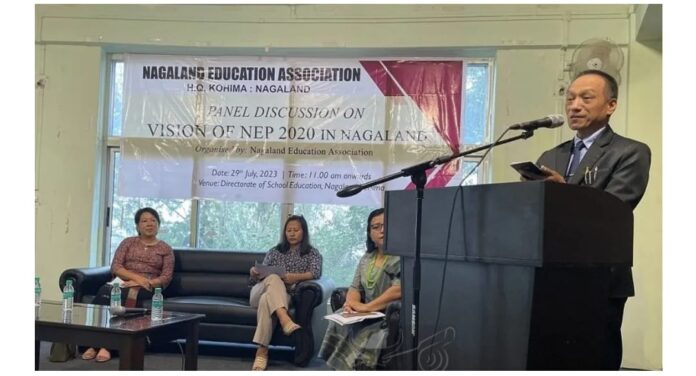The Morung Hall in Nagaland bore witness to a stimulating and thought-provoking panel discussion organized by the Nagaland Education Association. The event focused on delving into the visionary aspects of the National Education Policy (NEP) 2020, offering an insightful exploration of its potential impact on the region’s educational landscape.
The panel discussion, marked by intellectual fervor and diverse perspectives, aimed to decipher the NEP 2020’s implications for Nagaland and its populace. Eminent educators, policy experts, administrators, and community members graced the occasion, ensuring a holistic representation of stakeholders crucial to the state’s educational ecosystem.
The NEP 2020, introduced by the Government of India, envisions a transformative educational framework designed to shape young minds for the dynamic challenges of the 21st century. Recognizing the critical role of education in fostering national progress and individual growth, the policy underscores inclusivity, flexibility, and quality as its cornerstones.
The esteemed panelists initiated discussions by shedding light on the policy’s key components, emphasizing the significance of early childhood education, foundational learning, and ensuring universal access to quality education. The potential of vocational education in honing practical skills and nurturing entrepreneurship was also a point of interest, as it aligns with the region’s aspirations for self-reliance and economic empowerment.
One of the highlights of the discussion was the in-depth analysis of how the NEP 2020 aims to preserve and promote indigenous languages and culture. With Nagaland being home to diverse tribal communities, preserving local languages and traditions gains added importance. The panelists explored strategies to strike a balance between modernization and cultural preservation, fostering a sense of pride among the younger generations in their heritage.
Furthermore, the session delved into the policy’s thrust on technology integration in education, which holds the potential to bridge the urban-rural divide and extend quality learning opportunities even to the remotest corners of the state. However, concerns about infrastructural challenges and the need for digital literacy were also addressed, as these factors could influence the successful implementation of technology-driven educational initiatives.
Recognizing that the success of any policy lies in effective implementation, the panelists discussed actionable steps to ensure that the NEP 2020’s vision translates into tangible outcomes. They emphasized the importance of collaboration between educational institutions, the government, and communities to foster a conducive environment for nurturing young minds.
The panel discussion served as a platform for constructive dialogue, paving the way for future deliberations on enhancing the NEP 2020’s impact. Participants left the Morung Hall with a renewed sense of purpose and enthusiasm to work collectively towards a progressive and inclusive educational system in Nagaland.



